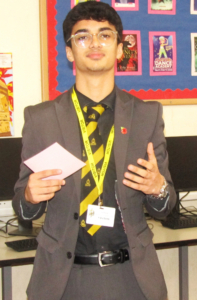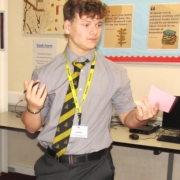A Successful Start for TBSHS Debaters
Round 1 of the ESU Mace
As usual, the first interschool debate of the new ‘season’ was a first-round heat of the ESU Mace, held this year at St. Mark’s West Essex Catholic School in Harlow. Our team was drawn to oppose hte motion “This House Would ban the use of facial recognition in public places” against a very young team from Comberton Village College,  who nonetheless proved to be confident and thoroughly prepared. Their well-structured opening speech began with an attack on the accuracy of facial recognition, with the speaker quoting statistics and arguing that “We should not run before we can walk”. She then went on to highlight the danger of data breaches. In response Kashan Johar (Year 12) stated the Opposition was not in favour of unregulated use of facial recognition and laid down conditions under which the police and security forces would be allowed to deploy it. He argued that police efficiency would be increased, citing the example of a dangerous criminal, who was speedily apprehended thanks to facial recognition. He then compared computerised systems with fallible, possibly tired, police officers trawling through hours of CCTV footage. Kashan also pointed out that the systems cannot be refined if they are banned.
who nonetheless proved to be confident and thoroughly prepared. Their well-structured opening speech began with an attack on the accuracy of facial recognition, with the speaker quoting statistics and arguing that “We should not run before we can walk”. She then went on to highlight the danger of data breaches. In response Kashan Johar (Year 12) stated the Opposition was not in favour of unregulated use of facial recognition and laid down conditions under which the police and security forces would be allowed to deploy it. He argued that police efficiency would be increased, citing the example of a dangerous criminal, who was speedily apprehended thanks to facial recognition. He then compared computerised systems with fallible, possibly tired, police officers trawling through hours of CCTV footage. Kashan also pointed out that the systems cannot be refined if they are banned.
Kashan Johar
The second Comberton speaker argued that the police cannot be trusted to be honest and focussed on the potential misuse of facial recognition systems to track people who may be innocent. He also pointed out that their effectiveness can be reduced by the wearing of masks, hoods and other face coverings and drew attention to the fact that facial recognition was far less accurate for black women than for white men. This last point was very well countered by Elliot Lavergne (Year 12),  who explained that this could be remedied by basing the algorithms used on a larger and more diverse sample. Elliot also asked his opponents whom we could trust if not the police and went on to explain that a tool that is designed to be deployed for good should not be banned because it can be misused, citing murder weapons such as kitchen knives and hammers as examples. He then examined hypothetical cases of missing persons, where the use of facial recognition systems would improve the chances of finding them quickly, thereby greatly reducing the suffering of concerned relatives.
who explained that this could be remedied by basing the algorithms used on a larger and more diverse sample. Elliot also asked his opponents whom we could trust if not the police and went on to explain that a tool that is designed to be deployed for good should not be banned because it can be misused, citing murder weapons such as kitchen knives and hammers as examples. He then examined hypothetical cases of missing persons, where the use of facial recognition systems would improve the chances of finding them quickly, thereby greatly reducing the suffering of concerned relatives.
Elliot Laverne
After a short floor debate in which most of the speeches were directed against the Proposition side, Henry Aylett (Year 13) summed up the case against the motion. He answered a question raised by a member of the audience very well and listed accuracy of identification, bias and efficiency as the key issues in the debate. He was able to show that the TBSHS arguments on these points were stronger than, and in some cases unanswered by, those of his opponents. In particular Henry argued that it is easier to monitor a system and improve it when it is in use than to detect its misuse if it is banned. The final proposer’s speech was much less wide-ranging and consisted mainly of repetition of earlier arguments and rebuttal of a few opposing ones.
In the second debate of the night our hosts proposed “This House Supports the implementation of a four-day school week” against another very young ‘swing’ team from Comberton, who were standing in for a school that had dropped out of the competition. The Proposition argued that a four-day week would be a positive step for mental health, reducing student stress and teacher workload, as well as school costs. They also mentioned studies that observed improved student attainment under such an innovation argued that students could use the extra day for independent study and/or extra-curricular activities.  The Opposition quoted studies that contradicted those of their opponents and raised issues such as the increased need for (and therefore cost of) childcare, which would disadvantage children from low-income families, especially those receiving free school meals. Their second speaker pointed out that, to cover the same curriculum, school days would have to be much longer.
The Opposition quoted studies that contradicted those of their opponents and raised issues such as the increased need for (and therefore cost of) childcare, which would disadvantage children from low-income families, especially those receiving free school meals. Their second speaker pointed out that, to cover the same curriculum, school days would have to be much longer.
Henry Aylett
In the final debate of the evening, Forest Academy from East London spoke in favour of building homes on the green belt against a team from the Perse School. The latter, familiar adversaries of ours from previous years, had much the better of this contest. The case for the motion was built around the assertion that it was the only way to solve the current housing crisis. The Proposition speakers drew attention to the large number of people who are homeless or living in overcrowded houses and answered the idea of building solely on brownfield sites by arguing that in many of them the land is contaminated and can only be used after very expensive ‘cleanups’. The Opposition responded to these points by saying that there are many unoccupied houses, especially in cities, and emphasising the importance of the green belt as a bulwark against urban sprawl and climate change. They also pointed out that over 60% of the green belt is agricultural land, so that building on it would make this country more dependent on imported food. This debate was notable for some excellent floor speeches, several of them from the TBSHS team, and their supporters and the quality of the summary speech from the Perse team.
After a mercifully short period of consultation, the two judges returned to announce that the three teams going through to the second round were, the Perse, St. Mark’s and TBSHS. They praised all the teams for the quality and depth of their research listening to the arguments put forward by their opponents and good answers to questions from the audience. In individual feedback afterwards, our speakers were also congratulated on their teamwork, as well as the excellent way in which they used evidence to justify their arguments and to lead the audience to conclusions.
Well done to Henry, Elliot and Kashan, who put a lot of hard work into preparing for the Mace debuts and many thanks to Katie Leslie & Mehmet Turner (both Year 12) for coming along to support them, and to Mr Boxall for driving the minibus.
A.D.Fraser



